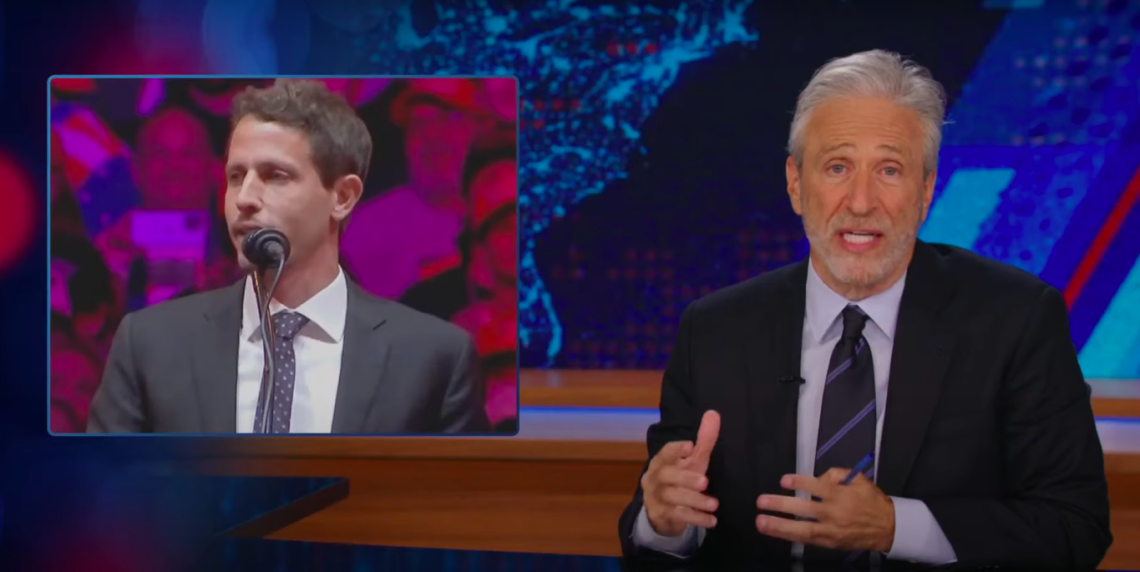Jon Stewart stands by Tony Hinchcliffe amid Trump rally controversy
In a lively display of his signature humor and insight, Jon Stewart took a moment on Monday’s “The Daily Show” to address the controversial jokes made by Tony Hinchcliffe at Donald Trump’s Madison Square Garden rally. True to his nature, Stewart offered a nuanced defense of the comedian while also pointing out the broader context of the event.
Spotlight on the rally speakers
Stewart began by discussing various speakers from the rally, including prominent figures like Tucker Carlson and Rudy Giuliani. He humorously noted that, for the media, one particular moment stood out: Hinchcliffe’s roast-style jokes, which included a provocative jab at Puerto Rico, labeling it a “floating island of garbage.”
“But of course, for the media there was one moment in particular that raised the alarms,” Stewart said, before playing a compilation of network anchors criticizing the comedian.
The roast comedy debate
Stewart then delved into the heart of the matter, defending Hinchcliffe’s performance. He acknowledged the politically charged atmosphere leading up to election day and admitted that having a roast comedian at a rally might not have been the wisest move from a campaign perspective. However, Stewart emphasized that Hinchcliffe was simply doing what he does best – delivering roast comedy.
“Obviously, in retrospect, having a roast comedian come to a political rally a week before election day and roasting a key demographic… probably not the best decision by the campaign politically, but to be fair, the guy’s just really doing what he does,” Stewart remarked.
A glimpse into Hinchcliffe’s comedic style
To further illustrate his point, Stewart played clips from Hinchcliffe’s “Roast of Tom Brady” set earlier this year. The segment showcased Hinchcliffe’s sharp wit and often cutting humor, leading Stewart to admit, albeit somewhat guiltily, his personal enjoyment of the jokes.
“Yes, yes, of course, terrible, boo. There’s something wrong with me. I find that guy very funny. I’m sorry, I don’t know what to tell you,” Stewart quipped, adding, “I mean, bringing him to a rally and having him not do roast jokes? That’d be like bringing Beyoncé to a rally and not…,” referencing a previous joke about Kamala Harris’ rally.
Reactions from the public and media
Hinchcliffe’s performance did not go unnoticed, drawing significant backlash from political commentators, cable news hosts, entertainers, and politicians alike. Celebrities such as Bad Bunny and Jennifer Lopez, as well as politicians like Alexandria Ocasio-Cortez, were among those who criticized the comedian’s jokes.
Analyzing the intersection of comedy and politics
The debate surrounding Hinchcliffe’s performance highlights a broader issue: the role of comedy in political discourse. Comedy has long been a tool for social commentary, capable of shedding light on uncomfortable truths and sparking important conversations. However, the line between humor and insensitivity can be thin, particularly in a charged political environment.
The power of roast comedy
Roast comedy, by its nature, pushes boundaries and challenges social norms. It relies on exaggeration and shock to elicit laughter, often at the expense of its subjects. This style of humor can be polarizing, as evidenced by the reactions to Hinchcliffe’s set. While some, like Stewart, appreciate its boldness, others view it as crossing the line.
Navigating comedy in polarizing times
The incident raises questions about the appropriateness of certain types of humor in political settings. Should comedians adapt their material to suit the context, or does this undermine the essence of their craft? Stewart’s defense of Hinchcliffe suggests that there is value in maintaining comedic integrity, even if it risks offending some audiences.
The future of political comedy
As society becomes increasingly polarized, the role of comedians in political discourse will continue to be a topic of debate. While some argue for more sensitivity and restraint, others champion the fearless approach of roast comedians like Hinchcliffe. Ultimately, the future of political comedy will depend on the willingness of audiences to engage with challenging and sometimes uncomfortable material.
To stay informed and engaged with the latest in comedy and political discourse, follow our updates and share your thoughts on social media. Whether you agree with Stewart or find Hinchcliffe’s humor too provocative, the conversation about the place of comedy in politics is more relevant than ever.

 Italian
Italian







